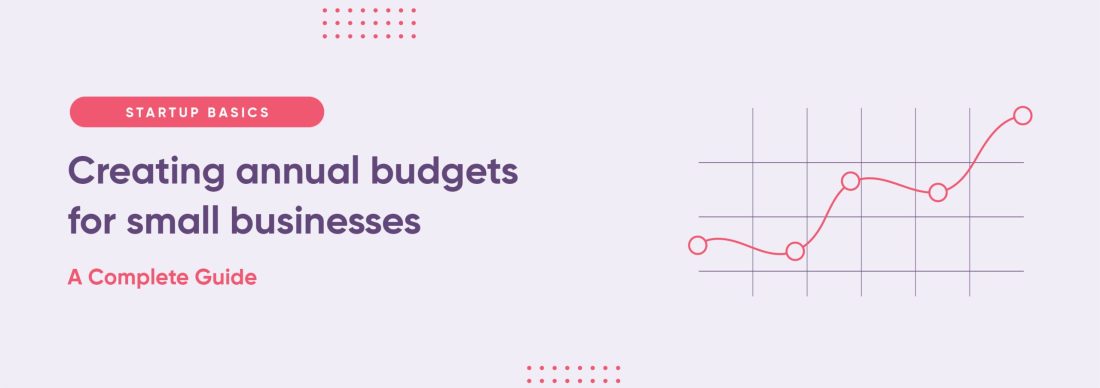A Complete Guide for Creating Annual Budgets for Small Businesses
May 04, 2023 | 15 Min Read


Jump to Sections
Stay updated
with our Blogs
We will keep you updated about our latest blogs
Share This Blog
What is the Purpose of a Budget?
Financial Planning: An annual budget helps small business owners to set financial goals, identify potential problems, and plan for future growth. It also enables businesses to anticipate and prepare for potential cash flow problems.
Resource Allocation: An annual budget helps small businesses allocate resources efficiently. By identifying and prioritizing the necessary outflows, businesses can ensure that they are using their financial resources efficiently. Entrepreneurs can determine if they can afford to invest in new business opportunities, equipment, and other growth prospects. This can prevent them from overspending, resulting in the optimal allocation of resources.
Performance Evaluation: An annual budget is a barometer for the business’s financial performance. By comparing actual results with the budget, businesses can identify areas where they are performing well and areas where they are lacking.
Improved Communication: An annual budget can increase communication and coordination between business owners, employees, and other stakeholders. It helps everyone understand the objectives of the business, and the necessary steps needed to achieve them. This can help create a more collaborative work environment.
Collecting Past Information for Preparing Your Annual Budget
One of the major steps in creating an annual budget is to use past financial information to forecast future revenues and expenses of the business. This information is normally collected from the following sources:
Financial Statements: The three main financial statements of the business are the income statement (profit and loss account), the statement of financial position (balance sheet), and the cash flow statement. These financial statements provide an in-depth record of the business’s transactions and performance throughout the year.
Bank Statements: The total cash inflows and outflows of the business for the previous year can be identified from the bank statements of the business. This can help understand areas of improvement which can be reflected in the next year’s budget.
Analyze Revenues and Expenses: Analyzing sales volumes, selling prices, and sales trends can assist in understanding, as well as forecasting future revenues. Also, the analysis of expenses such as utilities, overheads, and payroll processing can help managers forecast expenses for the year. The use of economic data such as inflation and interest rates can provide more accuracy to the numbers as well.
Accounting Software: If the business uses accounting software, reports, summaries, financial statements, as well as performance reports of the business can be generated for prior and potentially future years.
Talk to the Accountant: The business accountant can also give their insight into the past year’s financial performance and areas for improvement, which can be given importance in the coming year’s budget. Speak to an accounting firm for your small business accounting needs if you don’t already have one.
Want to learn about the next steps for growing your business ?
Setting Goals for Your Annual Budgets
The following are some steps to be considered when setting financial goals for the business.
Review Past Performance: The previous year’s financial statements and performance indicators can be reviewed to identify areas requiring improvement and areas that have performed well. This could help in setting financial goals for the next year in terms of revenues, expenses, and profits.
Define Your Priorities: What are the main objectives of the business this year? It could be to launch new products, expand the customer base, invest in the latest technology, and so on. These goals should be considered when preparing the budget.
Create a Revenue and Expense Plan: After identifying the business’s priorities, entrepreneurs can determine revenue targets such as target sales volumes or growth, and strategies to achieve them. They can also estimate the fixed and variable expenses of the business such as rent and salaries (fixed expenses), as well as marketing and utilities (variable expenses).
Determine Your Breakeven Point: The breakeven point is the point at which total revenues equal total costs. By determining the breakeven point, businesses can understand the minimum sales required to cover costs and make a profit.
Set Realistic Targets: Ensure that your targets are achievable and consider any potential challenges or risks that could impact your ability to meet your goals. Targets that are too ideal and difficult to achieve may be demotivating for owners and employees.
Developing and Identifying Key Components for Creating the Master Budget
A business normally has to make several budgets in order to create the final or master budget. These budgets include several key components essential for creating the final budget.
Revenue Forecast: The sales budget outlines the expected sales for the upcoming year, including estimates of sales volume, unit selling price, and total sales revenue. This is typically determined by market trends, competition, marketing strategies, and past performance.
Expense Budget: It is necessary to carefully estimate all expected expenses for the year including rent, payroll (salaries, bonus, and other human resource costs), marketing expenses, interest payments, and taxes.
Cash Budget: This outlines the expected inflows and outflows of cash for the upcoming year. A cash budget helps ensure that you have sufficient cash in hand throughout the year and to prepare in advance when to raise finance in case the company may seem to be cash-strapped in the near future.
Capital Expenditure: Any major capital expenditures in assets such as equipment, machinery, or vehicles for the year should be planned while creating the budget. If the cash position seems gloomy in the near term, businesses could decide to postpone such expenditures if such a need arises.
Contingency Plan: Such a plan should be prepared to highlight any possible unexpected event and how the business will respond to it. For example, how would the business respond to a sudden drop in cash inflows from customers due to a financial crisis or natural phenomenon?
The above can then be aggregated to form the master budgets, which are also called the budgeted financial statements; profit and loss statement, balance sheet, and cash flow statement.
Importance of Monitoring and Reviewing the Budget Periodically
Identify Variances: Monitoring and reviewing the budget allows you to identify any variances between actual and budgeted performance. This helps you understand why your business may not be performing well in some areas and why it is performing better in other areas. Understanding the reasons for the variances may also assist when preparing budgets in the future as well.
Take Corrective Action: Once the variances are identified, corrective action can be taken to bring performance in line with the budget to ensure the financial goals and objectives of the business are met by the year’s end.
Manage Cash Flow: Regularly monitoring the actual cash flows of the business ensures that sufficient funds are available to cover expenses and capital expenditures to fuel your business’s growth.
Seeking Help from a Professional: How Accountimize Can Help
Small business accounting can be a hassle for entrepreneurs, tangled in the daily operations of the business. While budgeting is just one of the many responsibilities that small business owners need to manage, outsourcing the bookkeeping, as well as the budgeting process to a professional can provide many benefits in terms of expert guidance, and improved accuracy in accounts while ensuring that more time can be spent on core functions.
So, if you’re a small business owner looking to streamline your budgeting and bookkeeping process, and achieve your financial goals, call us to talk to one of our experts today.
Book a Discovery call


Stay updated
with our Blogs
We will keep you updated about our latest blogs



